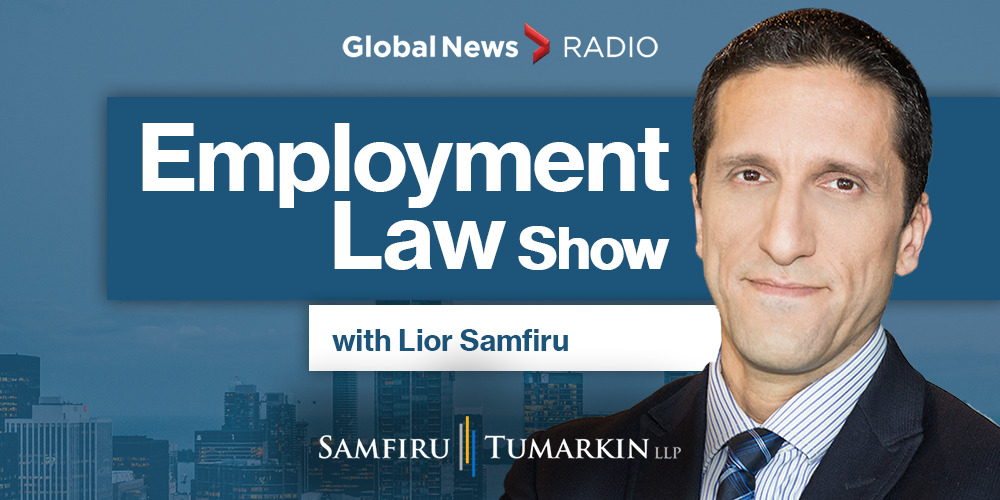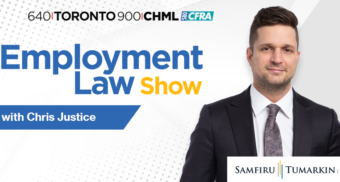Employment Law Show 640 Toronto – S9 E89

Episode Summary
Unpaid breaks, who pays for COVID-19 testing, answers to the question “Can my employer do this…?”, and more on Season 9 Episode 89 of the Employment Law Show on Global News Radio 640 Toronto.
Listen below as Employment Lawyer Lior Samfiru, Partner at Samfiru Tumarkin LLP, reveals your workplace rights in Toronto, the GTA, Hamilton, London, and across Ontario on the Employment Law Show. Lior shatters myths and misconceptions about severance pay, terminations, workplace harassment, overtime pay, wrongful dismissal, constructive dismissal, duty to accommodate, independent contractors, and more.
Listen to the Episode
Episode Notes
My employer is forcing us to take a one-hour unpaid break to avoid paying overtime. Can they do that?
An employer can’t force you to get an unpaid one-hour break. Practically speaking, you’d have to file a complaint with the Ministry of Labour for them to come in and make your employer pay employees for that extra half-hour break. You could try telling your employer you will be going to the Ministry of Labour, and they may change the policy.
If your employer asks for COVID-19 testing, do you have to pay for your tests yourself?
If your employer is asking for frequent test results, they have to pay for it. But if they’re only asking for a COVID-19 test once a month, you may have to pay for it. But if they’re asking for a test result every week, they have to pay for it. The reason is that asking you to pay for the test is a change to your terms of employment, and you could claim constructive dismissal. If you are part of a union, you have to talk to your union and get their support to make a grievance.
LEARN MORE
Can my employer force me to pay for my own rapid testing?
I work in sales and I asked for a raise. My employer altered my commission structure so my commission is lower now. Is that legal?
An employer is not legally obligated to give employees a raise. From a legal standpoint, they don’t have to provide it. However, they cannot legally reduce your pay. If the net effect of the change in your commission makes your commission equal to what it is before, they can get away with it. However, if the net effect is that your commission is going to be lower, that is a change to the terms of your employment, and that could be a constructive dismissal.
LEARN MORE
Can my employer reduce my wages in Ontario?
I hurt my back and I’ve been on WSIB. Now my employer is asking me to take a company physical. Can I refuse?
If you’re concerned that they might hold the results against you, and say that you’re not really injured, then I would refuse to take the company physical. You can show them the report from your doctor and tell them if they have any specific questions about your health they can ask your doctor directly to give them an update on your health. It is your right to refuse the company physical if you don’t feel comfortable with that.
My company wants all employees vaccinated by November, or they will be letting us go. If they let me go is that a constructive dismissal?
Because you are currently being contracted out to a third party, and that third party company wants all on-site employees to be vaccinated by October, and you aren’t vaccinated, your employer could let you go under something called a ‘frustration of contract’. If they put you on an unpaid leave until November, and then let you go when their vaccine policy takes effect, that would be a constructive dismissal, and you would be owed severance.
Can my employer do… this?
#1 Can my employer keep me on a layoff or leave indefinitely?
Regardless of the pandemic, an employer does not have the automatic right to put an employee off on a leave or on a layoff to begin with. If they do, you as the employee have the right to consider that a termination of employment. If you don’t, you could be sitting at home for months or years until your employer calls you back. The other option is to say that by putting you on a layoff, they have terminated your employment. If you do that, now your employer has to pay you severance.
#2 Can my employer change my job or hours of work as a result of COVID-19?
No, the term constructive dismissal should always come to mind when we’re talking about changes to terms of employment, and that has not gone away during the pandemic.
If your job duties have changed in a significant way, if your pay has been reduced, if your shifts and hours have changed, or maybe your employer has decided to relocate you to a completely different location – in any of those situations can choose to treat that change of terms of employment is a constructive dismissal.
#3 Do I have any right to stay home if I’m recalled to the office?
The reality is that if you were working in the office before the pandemic, and you were working from home during the pandemic, at this point the employer can say they want to go back to the way things were pre-pandemic. An employer is allowed to do that. If you refuse to return to the office, your employer can say that’s a resignation, or potentially terminate your employment ‘for cause’ or for abandoning your job.
If you’re going to assume that you can work from home forever, before you make any major decisions, speak to your employer, and find out what their long-term plans are. Maybe you can reach some sort of a compromise, like alternating working from the office and home. But ultimately, an employer can require you to go back to the office if that’s what you were doing before.
LEARN MORE
Employee rights when returning to the office post COVID-19
I’m a teacher and my hours change every semester. If my hours are reduced significantly, could I claim constructive dismissal?
Obviously, over the past ten years of working for your employer, you’ve developed a sort of baseline of the number of hours a week you are expected to work. If your employer were to reduce your hours to 20 hours a week, for example, then yes, you could claim constructive dismissal.
Can my employer avoid paying me severance if the business is suffering because of COVID-19?
Paying severance is not optional for employers, and it is not dependent on whether they can or not, or whether they think they should. An employer has to pay severance because it is a legal obligation, like paying taxes. If the employer actually doesn’t have the money to pay severance, as a practical matter, you won’t get your severance and the employer may end up in bankruptcy. But an employer can’t avoid paying severance otherwise, there are laws in place that obligate them to pay, which can sometimes be up to two years’ pay.
I was let go ‘for cause’ because my employer said I missed too many days of work for medical reasons. Can they do that?
No, you cannot be penalized because you are sick. The whole point of penalizing someone is to correct behavior or to punish someone for something bad that they did. If you’re sick, what have you done that’s bad? Nothing. You haven’t chosen to be sick. You haven’t chosen to deliberately miss days of work. So that’s nonsense. Not only can your employer not fire you for cause that could potentially be a human rights violation, but it’s also a wrongful dismissal, it’s illegal.




